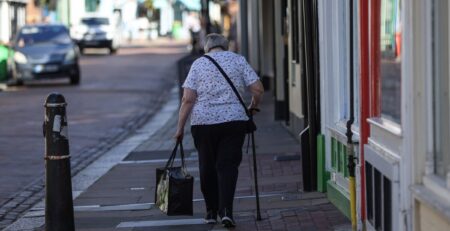More German pensioners are slipping into poverty each year
For an increasing number of retirees, Germany’s state pension payments are not sufficient to keep up with the rising cost of living. While the Left Party are calling for a 1.200-euro per month pension, the VdK argue that insecure working conditions lie at the heart of the problem.
10 percent more retired people are claiming benefits in Germany
A request submitted to the Federal Office of Statistics (Destatis) by the German Left Party has revealed that between June 2022 and June 2023, the number of retirees who have to claim basic security benefits (Grundsicherung) to top up their pension, rose by 10 percent.
The German state pension provides basic payments of around 70 percent of the net income people received when they were working.
Compared to the previous year, 63.250 more people are now receiving the additional money. This brings the total number of pensioners in Germany who currently have to claim benefits to top up their pension packets, to a total of 681.820.
The figures continue a trend seen in the previous year. Between 2021 and 2022, the number of retired people struggling to get by with their state pension income alone had already risen by 9 percent.
But according to Germany’s social welfare association the VdK, the true picture is even more dire than that painted by the new figures. The organisation estimates that 70 percent of people who are eligible for basic security benefits don’t even claim the money, either because they do not know they are eligible or because they are too embarrassed to do so.
Pensioners in eastern states are struggling to make ends meet
Unsurprisingly, the number of Grundsicherung claimants was higher in federal states in the East of Germany, where post-reunification economic inequality means that throughout their working lives, people put in longer hours and earn less compared to their counterparts in western Germany.
Saxony saw the biggest increase, with 22,8 percent more retirees claiming Grundsicherung between June 2022 to June 2023. The states in western Germany which saw the biggest increases were Lower Saxony and Saarland, with a comparatively smaller 11,3 percent more claimants. Hamburg saw a rise of just 4,3 percent.
Pensions must account for periods of unpaid care work, says VdK
Speaking to the RND, Left Party member Dietmar Bartsch called for the monthly statutory pension to be raised to 1.200 euros. “Old age poverty is breaking record after record”, said Bartsch.
For the VdK, the foundational matters which lead to pensioner poverty also need to be urgently addressed. “One reason why so many people’s pension packets are not enough to live on is that long periods of carrying out care work for children or older family members is still not accounted for when it comes to pension entitlement,” VdK President Verena Bentele told IamExpat.
The VdK stressed that security in working life in Germany will make all the difference when it comes to making sure people don’t slip between the cracks once they retire. “A poverty-proof minimum wage of at least 14 euros per hour, more collective bargaining agreements among companies and work contracts which are tied to social security contributions rather than mini-jobs and freelance work. This is the only way to really combat poverty in old age,” the organisation said.
Read more @iamexpat











